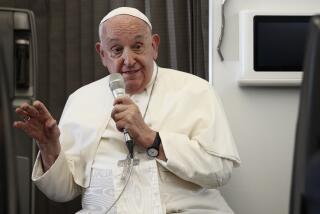Archbishop Bucks Anti-Abortion Trend : Issues: Weakland in Milwaukee criticizes tactics of many in the movement. There are no simple answers to the concerns of women, he says.
- Share via
MILWAUKEE — Roman Catholic Archbishop Rembert Weakland, bucking the trend toward increasing confrontation in fighting legalized abortion, has issued a statement that criticizes many in the anti-abortion movement as narrow and lacking compassion and urges the church to spend more time listening to the concerns of women about the root causes of abortion.
The 21-page statement is the archbishop’s response to a series of six “listening sessions” held with women around the Milwaukee Archdiocese earlier this year. The sessions fulfilled a promise he made in November when the U.S. bishops agreed to make the abortion issue a top priority. At the time, Weakland, long a spokesmen for women’s concerns, promised to go back to his archdiocese and consult women on the matter.
Weakland not only takes issue with anti-abortion tactics but also advocates that the church “allow to our politicians as much latitude as reason permits.”
In a number of places, the statement mentions the consistent life ethic, a concept that would place abortion amid a whole range of human life issues--including poverty, hunger, education and abuse of children and women--some of which have a direct bearing on women’s decisions to have abortions.
While not veering from the church’s ban on abortion in most circumstances, the archbishop pointed out that the teaching “does not have the full support of many Catholics, especially of many women, because it seems to be too simplistic an answer to a complicated and emotional question.”
The statement’s toughest language is aimed at elements of the anti-abortion movement and fundamentalist groups, which Weakland sees as heavily influencing some in the movement.
“Many dislike the narrowness of so many in the pro-life movement, their tactics, their non-acceptance of the consistent life ethic approach, their lack of compassion, their alliances with groups that often are very anti-Catholic in other areas, their lack of civility and so on,” he says. Consequently, he adds, many women and priests are being driven away from the movement.
“Many priests, moreover, feel uncomfortable with some of the political and other aggressive activities of the pro-life movement. Some of the rhetoric and literature seem ugly and demeaning.”
Weakland also wrote that he was “surprised and disturbed by the strong influence of fundamentalist positions” on the anti-abortion movement. “I say disturbed because they did not seem to know the Catholic approach to Scripture and fell into proof-texting in ways that are not our tradition. I will have to talk much with the priests and other pastoral ministers in the diocese about this unwholesome influence and what it means. It might also account for some of the narrowness of vision on the part of some of the pro-life people one meets.”
At the same time, the statement criticizes the abortion rights movement’s advocacy of “ ‘rights’ over one’s body or ‘rights to an abortion.’ ”
“The church has never accepted this point of view, namely, that one has control over one’s body to do with it what one wants,” the statement says. “The body is not a mannequin nor a machine. Cutting off any part of the body just to show that one has control over this ‘machine’ is contrary to the whole approach our faith takes to the body as integral to the identity of the whole person.”
On a personal level, the archbishop says he “came away from the listening sessions making a few resolutions. I would never be so glib in talking about the ‘moment of conception’ since from a medical point of view that is far from accurate: conception is a long process, not a moment. I have learned from letters and from the discussion among the health care women that the first days and weeks of the growth of a fetus are . . . anything but simple. I know I must be more precise and correct in talking about those stages of development.”
He says he also will be more careful in talking about infertility and miscarriages, having learned that a very real sense of loss follows a miscarriage.
“Nor will I talk so glibly about bringing the baby to term and then ‘just give up for adoption’ since I learned that there can be so much grieving here, too, and a deep sense of loss that often needs to be faced.”
The statement also asks what would happen if a total ban on abortion were to occur. “Would the wealthy, because they could afford to do so, then go to other countries where abortions would be permitted? Would there be again the back-alley illegal practitioners? These are urgent questions, especially if there is not a clear consensus of the population on this issue.”
More to Read
Sign up for Essential California
The most important California stories and recommendations in your inbox every morning.
You may occasionally receive promotional content from the Los Angeles Times.













